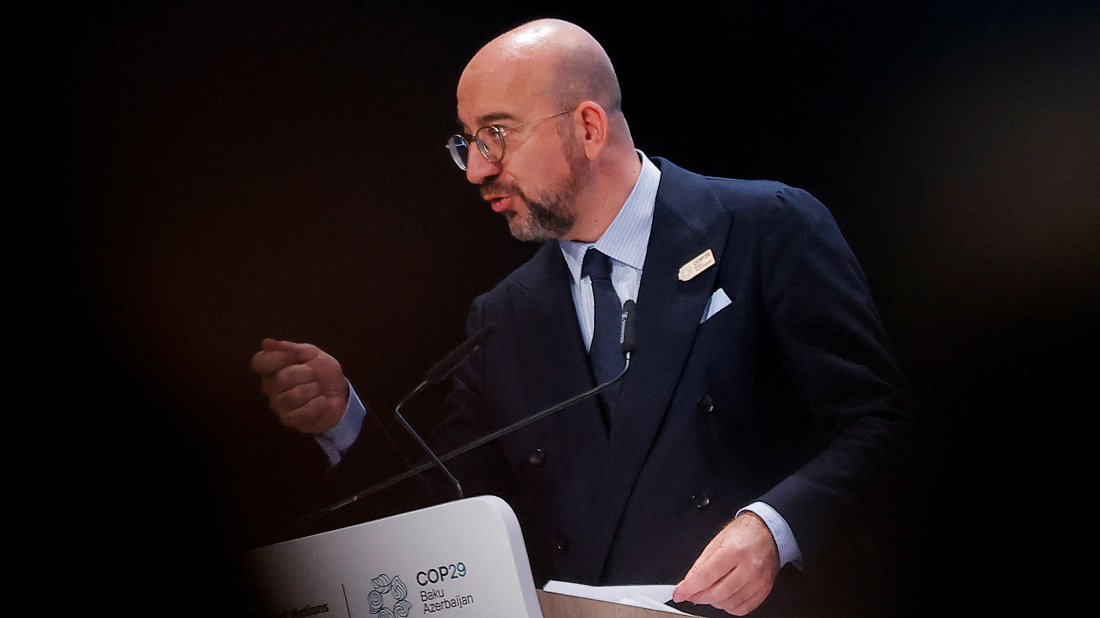Trump says he will raise global tariff rate from 10% to 15%
President Donald Trump said on Saturday (21 February) that he will raise temporary tariffs on nearly all U.S. imports from 10% to 15%, the maximum all...

President Emeritus of the European Council Charles Michel tells AnewZ TV he is “confident” in the Armenia–Azerbaijan peace process, as experts point to rare alignment between the two sides on regional connectivity and future cooperation.
President Emeritus of the European Council Charles Michel, in an exclusive interview with AnewZ TV, said he was “very pleased and even confident” about recent developments in peace efforts between Armenia and Azerbaijan, adding that a sustainable settlement could unlock broader regional cooperation.
Reflecting on his role as a facilitator in EU-led negotiations over the past several years, Michel said, “I tried by being innovative, helpful and respectful to make suggestions to help the peace process.” He added: “My wish is that in the weeks and months to come, even more efforts can be done so that this peace process will be a sustainable framework.”
Michel’s comments come as expert observers in the region highlight growing consensus between Baku and Yerevan on key issues such as trade and transit infrastructure.
In discussions published by AnewZ TV, political analyst Rusif Huseynov said both Armenia and Azerbaijan were increasingly aligned on connectivity goals. “They are driven by the desire to open communication lines and roads not only for their own benefit but for regional and even transcontinental connectivity,” he said, noting the strategic relevance of the so-called Middle Corridor linking Europe and Asia.
Orkhan Amashov, senior analyst at AnewZ TV, noted that despite positive messaging from President Ilham Aliyev—who recently voiced optimism during a summit in Astana—“concrete agreements have not yet been attained,” especially between the U.S. and Armenian sides. However, he said both capitals “seem to be happy,” indicating progress in principle.
Domestic political developments remain a factor, particularly with parliamentary elections in Armenia expected in June 2025. Boris Navasardian, a media expert and participant in AnewZ-hosted expert dialogues, said: “When we are talking about democratic elections, this means that they are not predictable.” He added that continued public support for the peace process—regardless of political change—will be essential: “The more productive our meetings are in delivering constructive ideas, the better our societies will be prepared to continue the peace process.”
The broader geopolitical context includes sustained efforts by the European Union, the United States, and Russia to mediate between the two countries following the 2020 Nagorno-Karabakh war. While several rounds of talks have been hosted by Brussels and Washington, a final agreement has yet to be signed.
Still, observers point to momentum. “It’s not only about Armenia, Azerbaijan, or South Caucasus,” said Huseynov. “It’s about global trade.”
Michel’s call for “a sustainable approach” echoes this wider strategic logic, as Brussels seeks to bolster its role in stabilising the region through diplomatic engagement and economic incentives.
Quentin Griffiths, co-founder of online fashion retailer ASOS, has died in Pattaya, Thailand, after falling from the 17th floor of a condominium on 9 February, Thai police confirmed.
At least four people have died and 17 others were injured after a liquid gas truck overturned and exploded in Santiago, Chile’s capital, authorities confirmed on Thursday. Police said the driver was among those killed.
Cubans are increasingly turning to solar power to keep businesses operating and basic household appliances running during prolonged electricity cuts, as fuel shortages make diesel generators and other temporary solutions more difficult and costly to maintain.
Ukraine’s National Paralympic Committee has announced it will boycott the opening ceremony of the Milano Cortina 2026 Paralympics in Verona on 6 March, citing the International Paralympic Committee’s decision to allow some Russian and Belarusian athletes to compete under their national flags.
Eric Dane, the actor best known for his roles in 'Grey’s Anatomy' and 'Euphoria', died on Thursday, at the age of 53 after a battle with amyotrophic lateral sclerosis (ALS). His family confirmed his death after what they described as a “courageous battle” with ALS.
At least 10 people were killed and 50 wounded in Israeli strikes in Lebanon's Bekaa Valley on Friday (20 February), two security sources told Reuters, after the Israeli military said it had targeted Hezbollah sites in the Baalbek area.
Iran’s Foreign Minister Abbas Araghchi on Saturday (21 February) dismissed U.S. claims that 32,000 civilians were killed during protests in Iran. He said Tehran has already released official figures and called for evidence to support any higher estimates.
Uzbekistan's president Shavkat Mirziyoyev has held a series of high-level meetings in the U.S. aimed at strengthening bilateral economic and strategic ties between the two countries.
Türkiye has signalled readiness to contribute to a proposed Gaza stabilisation force during the inaugural Board of Peace meeting on Thursday (19 February), but according to former Turkish diplomat Mehmet Öğütçü, the decisive factor will be whether Israel and the United States agree on Ankara’s role.
Türkiye is prepared to contribute troops to a proposed international stabilisation force for Gaza, Turkish Foreign Minister Hakan Fidan said on Thursday.
You can download the AnewZ application from Play Store and the App Store.

What is your opinion on this topic?
Leave the first comment